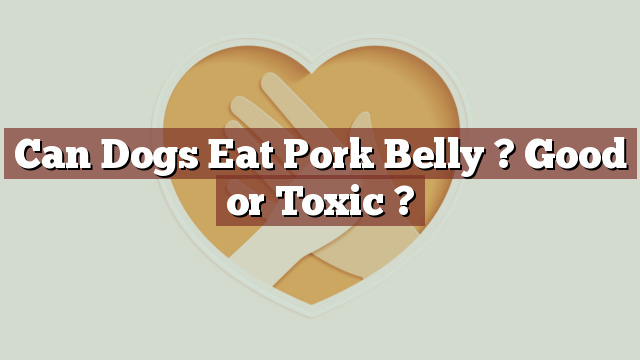Can Dogs Eat Pork Belly? Good or Toxic?
It is important for pet owners to be aware of what foods are safe for their furry friends. In this article, we will explore whether dogs can eat pork belly and determine if it is a good addition to their diet or a potentially toxic food.
Nutritional Value of Pork Belly for Dogs
Pork belly is a cut of meat that comes from the belly of a pig. It is known for its rich flavor and high fat content. In terms of nutritional value, pork belly is a good source of protein and various vitamins and minerals. It contains essential amino acids that are beneficial for a dog’s overall health.
Is Pork Belly Safe or Toxic for Dogs?
Dogs can eat pork belly, but it should be given to them in moderation. The high fat content in pork belly can be a cause for concern. Consuming excessive amounts of fatty foods may lead to pancreatitis in dogs, which is a serious condition that affects the pancreas. Additionally, seasonings or spices used in cooking pork belly, such as garlic or onions, can be toxic to dogs and should be avoided.
Veterinarians recommend that dog owners remove the skin and excess fat from pork belly before feeding it to their pets. This helps reduce the risk of digestive issues and pancreatitis. It is also important to cook pork belly thoroughly to eliminate any potential parasites or bacteria that could harm dogs.
Potential Risks or Benefits of Dogs Consuming Pork Belly
While pork belly can provide nutritional benefits to dogs, it is important to be aware of the potential risks associated with its consumption. As mentioned earlier, the high fat content in pork belly can lead to pancreatitis in dogs. This condition can cause symptoms such as vomiting, diarrhea, and abdominal pain. Furthermore, the spices or seasonings used in preparing pork belly can be toxic to dogs, leading to additional health problems.
On the other hand, incorporating pork belly into a dog’s diet in small amounts can provide protein and essential amino acids. However, it is crucial to ensure that pork belly is not the main source of protein in a dog’s diet, as a balanced diet is key to their overall well-being.
What to Do If Your Dog Eats Pork Belly
If your dog accidentally consumes pork belly, it is important to monitor them for any signs of discomfort or illness. If they show symptoms such as vomiting, diarrhea, or abdominal pain, it is recommended to seek veterinary attention immediately. A veterinarian will be able to provide the necessary guidance and treatment based on the specific situation.
Conclusion: Dogs and Pork Belly – Proceed with Caution
In conclusion, dogs can eat pork belly, but it should be given in moderation and with caution. The high fat content and potential toxicity of seasonings used in cooking pork belly pose risks to a dog’s health. It is advisable to remove excess fat, cook it thoroughly, and avoid using any spices or seasonings that are toxic to dogs. As always, consulting with a veterinarian is recommended to ensure the safety and well-being of your furry companion.
Thank you for investing your time in exploring [page_title] on Can-Eat.org. Our goal is to provide readers like you with thorough and reliable information about various dietary topics. Each article, including [page_title], stems from diligent research and a passion for understanding the nuances of our food choices. We believe that knowledge is a vital step towards making informed and healthy decisions. However, while "[page_title]" sheds light on its specific topic, it's crucial to remember that everyone's body reacts differently to foods and dietary changes. What might be beneficial for one person could have different effects on another. Before you consider integrating suggestions or insights from "[page_title]" into your diet, it's always wise to consult with a nutritionist or healthcare professional. Their specialized knowledge ensures that you're making choices best suited to your individual health needs. As you navigate [page_title], be mindful of potential allergies, intolerances, or unique dietary requirements you may have. No singular article can capture the vast diversity of human health, and individualized guidance is invaluable. The content provided in [page_title] serves as a general guide. It is not, by any means, a substitute for personalized medical or nutritional advice. Your health should always be the top priority, and professional guidance is the best path forward. In your journey towards a balanced and nutritious lifestyle, we hope that [page_title] serves as a helpful stepping stone. Remember, informed decisions lead to healthier outcomes. Thank you for trusting Can-Eat.org. Continue exploring, learning, and prioritizing your health. Cheers to a well-informed and healthier future!

